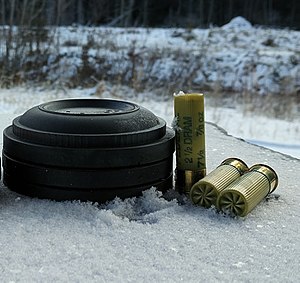20-gauge shotgun
| 20 gauge | ||||||||||||||||||||||||
|---|---|---|---|---|---|---|---|---|---|---|---|---|---|---|---|---|---|---|---|---|---|---|---|---|
 Three 23⁄4" 20-gauge shells (right) loaded with #71⁄2 birdshot. | ||||||||||||||||||||||||
| Type | Shotgun | |||||||||||||||||||||||
| Place of origin | ||||||||||||||||||||||||
| Production history | ||||||||||||||||||||||||
| Manufacturer | Various | |||||||||||||||||||||||
| Variants | 21⁄2" (63.5 mm) 23⁄4" (70 mm) 3" (76.2 mm) | |||||||||||||||||||||||
| Specifications | ||||||||||||||||||||||||
| Case type | Rimmed, straight | |||||||||||||||||||||||
| Bullet diameter | .615 in (15.6 mm) | |||||||||||||||||||||||
| Shoulder diameter | .684 in (17.4 mm) | |||||||||||||||||||||||
| Base diameter | .697 in (17.7 mm) | |||||||||||||||||||||||
| Rim diameter | .766 in (19.5 mm) | |||||||||||||||||||||||
| Rim thickness | .0484 in (1.23 mm) | |||||||||||||||||||||||
| Case length | 2.76 in (70 mm) | |||||||||||||||||||||||
| Primer type | Shotshell Primer | |||||||||||||||||||||||
| Maximum pressure | 12,000 psi (83 MPa)[1] | |||||||||||||||||||||||
| Ballistic performance | ||||||||||||||||||||||||
| ||||||||||||||||||||||||
The 20-gauge shotgun, also known as 20 bore, is a type of smoothbore shotgun. 20-gauge shotguns have a bore diameter of .615 in (15.6 mm), while the 12-gauge has a bore diameter of .729 in (18.5 mm).[2] 12-gauge and 20-gauge shotguns are the most popular gauges in the United States.[3][4] The 20-gauge is popular among upland game hunters, target shooters, and skeet shooters.[4]
Description
[edit]20 lead balls of the diameter of a 20-gauge shotgun bore weigh one pound, while just 12 lead balls of the diameter of a 12-gauge shotgun bore equals the same weight.[2] A 20-gauge shotgun is more suitable for hunting certain types of game or for some hunters because it may have less felt recoil than an identical shotgun in a larger gauge, [5] and guns may be smaller and weigh less, though this has changed since the introduction of the 3-inch magnum shotshell.[3]
Regarding the yellow body tube color that 20-gauge ammunition usually has, it has been reserved in SAAMI documentation saying "SAAMI has reserved yellow for 20 gauge ammunition" "This ammunition shall have a body tube that is primarily yellow" "Yellow shall not be used for any other gauge/bore shotshell body" "No other recommendations are made as to the color of service body tubes for other gauges/bores"[6] This color designation may be designed to aid in identifying 20-gauge shells. A 20 ga shell if mixed in with 12 ga. shells will enter the chamber and lodge inside the bore at the end of the chamber. If a 12 ga shell is loaded and fired behind the lodged 20 ga shell the result is catastrophic. [7]
Specifications
[edit]20-gauge shotguns are especially suitable for hunting game birds such as quail, grouse and mallards when using lead-free birdshot. A 20-gauge buckshot load would most commonly be utilized in close- to mid-range self-defense scenarios.[citation needed] While slug loads are ballistically less accurate than rounds used in rifles, powerful, high-grain slug loads can provide improved ballistics for hunting deer when paired with a rifled barrel.[8]
Recoil
[edit]While the 20-gauge is generally perceived to have less felt recoil than the 12-gauge, there are too many variables, including gun weight, type of shotgun, stock pattern, shot weight, shell size, etc. for that opinion to be a fact.[9][10] There may be little to no difference between the two when using target ammunition. Loads for waterfowl will tend to produce more felt recoil in a 12-gauge shotgun than in a 20, but this may not be the case depending on the gun used.[9] Full-power 20-gauge shells fired from a light 5 lb (2.3 kg) gun will have more felt recoil than those fired from a heavy 7 lb (3.2 kg) gun.[11] To do a true comparison, two identical shotguns, one in 12 and one in 20, with identical ammunition (other than gauge) have to be compared. In those cases, the 12-gauge does generate more recoil energy than the 20.[9][12]
See also
[edit]References
[edit]- ^ Saami pressures. (n.d.). Retrieved May 3, 2023, from https://leverguns.com/articles/saami_pressures.htm
- ^ a b "Introduction to Shotgun Gauges". chuckhawks.com.
- ^ a b Barsness, John (August 3, 2016). "The All-Around 20-Gauge". GUNS Magazine.
- ^ a b Bourjaily, Phil (February 4, 2022). "12 Gauge vs 20 Gauge for Hunting Just About Anything". Field & Stream.
- ^ DeRosa, A. J. (May 5, 2023). "What is the Best Youth 20-Gauge Shotgun?". Project Upland.
- ^ "ANSI/SAAMI Cartridge & Chamber Drawings, 2019-04-23 Shotshell, PDF page 50 MISCELLANEOUS: BODY TUBE COLOR" (PDF).
- ^ The Danger of Using Wrong Ammunition Hunter-Ed Archived January 1, 2024, at the Wayback Machine
- ^ Maddox, Brandon (January 22, 2021). "SHOTGUN AMMO TYPES: BUCKSHOT VS. BIRDSHOT VS. SLUG". Silencer Central. Archived from the original on November 7, 2022. Retrieved November 7, 2022.
- ^ a b c "Shotgun Recoil Table: 12-gauge vs 20-gauge vs .410 – Backfire". December 31, 2021.
- ^ Twenty Gauge versus Twelve Gauge: What is Best?. Randy Wakeman Archived March 3, 2023, at the Wayback Machine
- ^ Bourjaily, Phil (August 2, 2023). "Will the 20 Gauge Shotgun Ever Replace the 12 Gauge?".
- ^ "12 Gauge vs 20 Gauge: Shotgun Caliber Comparison by Ammo.com". Ammo.com.
External links
[edit]- Cartridge & Chamber Drawings ANSI/SAAMI Cartridge & Chamber Drawings PDF links page
- [1] ANSI/SAAMI Cartridge & Chamber Drawings, 2019-04-23 PDF for Shotshells
